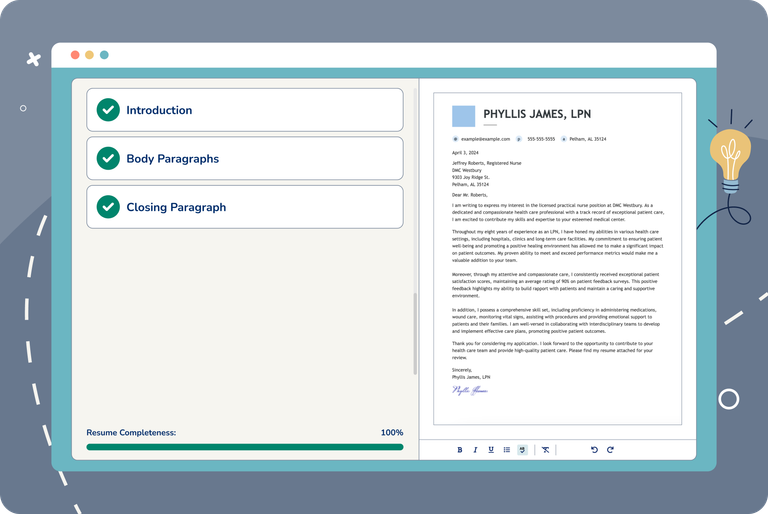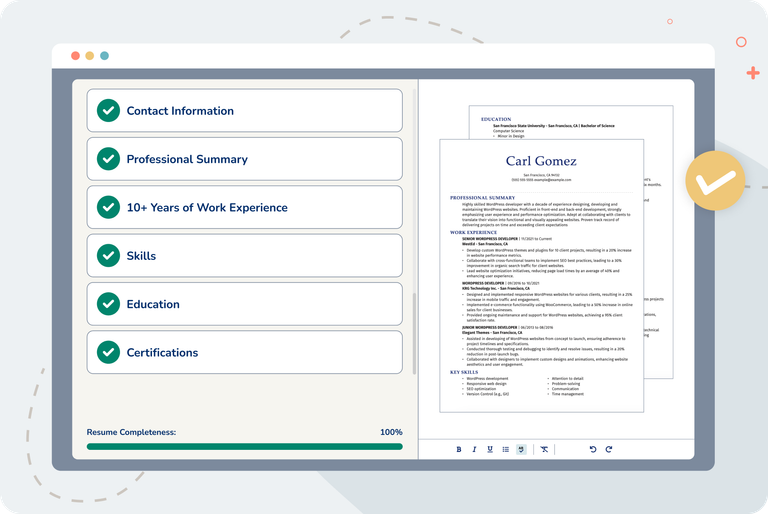HR Skills for Your Resume (Examples & Tips)

Our customers have been hired at: *Foot Note
AI Resume Skills Generator

Human resources work is the cornerstone of any organization, encompassing various responsibilities to optimize a company’s human capital. From talent acquisition and onboarding to performance management and employee relations, HR professionals navigate the intricate balance between organizational objectives and the well-being of their workforce.
Human resources is one of the fastest-growing fields in the United States, with a continued, steady demand for HR professionals across various industries. To stay ahead in this dynamic and evolving profession, you must adapt to new trends by enhancing and developing new human resources skills.
Make a resume with MyPerfectResume
Our Resume builder can help you write the perfect resume. Start Now!
What are HR skills?
Human resources (HR) skills are diverse capabilities essential for effectively managing an organization's workforce. A human resources professional needs a broad range of skills to excel.
Examples of HR skills
Hard skills
Hard skills are concrete, job-specific abilities and knowledge that can be learned and measured. You need hard human resources skills to ensure a company’s processes run smoothly.
Examples of hard human resources skills include:
- Recruitment and selection
- Employment law and compliance
- Human Resources Information Systems (HRIS)
- Data analysis and HR metrics
- Compensation and benefits administration
- Training and development
- Performance management
- Employee relations
- Workforce planning and succession planning
- Health and safety compliance
Soft skills
Soft skills help HR professionals navigate relationships, drive employee engagement and facilitate processes.
Here are 10 essential soft human resources skills:
- Strategic thinking
- Time management
- Stress management
- Adaptability
- Presentation
- Leadership
- Change management
- Analytical skills
- Innovation
- Networking
Technical skills
Technical skills are vital to the human resources industry because they help human resources workers assess conditions accurately, make informed clinical decisions and provide appropriate interventions.
Some critical technical human resources skills include:
- HRIS (Human Resources Information Systems) management
- Applicant Tracking Systems (ATS) proficiency
- Data analytics and reporting
- HR metrics and KPIs (Key Performance Indicators) tracking
- Organizational development interventions
- Talent acquisition strategies and techniques
- Interviewing skills and techniques
- Performance management systems
- Compensation analysis and benchmarking
- Computer literacy
Interpersonal skills
Interpersonal skills are vital to human resources work because they allow HR workers to build trustful relationships with employees and prospective employees.
Key interpersonal human resources skills include:
- Active listening
- Emotional intelligence
- Empathy
- Diplomacy
- Mediation
- Negotiation
- Cultural competence
- Diversity and inclusion
- Conflict management
- Relationship building
Transferable skills
Transferable skills are valuable in human resources because they can be applied across industries and enable HR professionals to adapt to the ever-changing field.
Here are ten important transferable human resources skills:
- Ethics
- Organization
- Decision making
- Written and verbal communication
- Problem-solving
- Creativity
- Critical thinking
- Flexibility
- Attention to detail
- Collaboration
How to improve your HR skills
Continuously enhancing your skills is essential for staying up to date with ever-evolving workforce landscape, staying compliant with regulations, helping companies attract and retain employees and keeping employees engaged.
Here are five tips for developing your human resources skills:
- Connect to colleagues: Build a strong professional network within your company by joining HR associations or online communities.
- Keep learning: Attend conferences, seminars, and workshops to stay on top of the latest best practices, technologies and processes in human resources.
- Get specialized training: Consider getting certified in a specialized area of human resources.
- Find a mentor: Reach out to experienced HR professionals for guidance, advice and support throughout your career.
- Take on new challenges. Step out of your comfort zone and volunteer for assignments that stretch your abilities.
How to highlight HR skills on your resume
When writing your resume, be mindful of how you display your human resources skills. Create a separate section to spotlight five or ten job-relevant skills, and use other resume sections to explain how you have used your skills in previous roles.
Here’s how to display your human resources skills in your resume in six steps:
- Review the job description and match your human resources skills and accomplishments to the job requirements.
- Choose the best resume format for your work experience and career goals.
- Pick a resume template to ensure your resume is expertly formatted and professional.
- Create a skills section and add five to ten human resources skills.
- Write a professional summary or resume objective focused on two or three of your key human resources skills.
- In your work history section, highlight three to five measurable achievements that show the impact your skills have had on past employers. For example, “Implemented a new employee retention strategy, resulting in a 15% decrease in turnover rates within the first year of implementation.”
Pro tip: Write a cover letter to complement your resume and provide more context about your human resources skills.
Common tools and technologies used in HR
In the human resources field, technology is indispensable for streamlining processes, increasing efficiency, and strategically managing workers.
Here are some useful tools and technologies for your human resources skill set:
- Human resources information systems (HRIS), such as HRIS platforms like Workday, SAP SuccessFactors, Oracle HCM, and ADP Workforce Now, help HR professionals manage employee data, payroll processing, benefits administration, and reporting.
- Applicant tracking systems (ATS) like Greenhouse, iCIMS, Lever and JazzHR automate recruitment by managing job postings, tracking applicants, scheduling interviews, and storing candidate information.
- Learning management systems (LMS) such as Cornerstone OnDemand, Moodle and TalentLMS enable organizations to deliver and manage employee training and development programs, track progress and assess learning outcomes.
- Performance management software like BambooHR, Halogen and 15Five help human resources workers facilitate goal setting, collect feedback, process employment performance evaluations and develop employee development plans.
- Time and attendance tracking tools such as Kronos, ADP Timekeeping and TSheets automate timekeeping processes, track employee hours and manage employee attendance records.
- Employee engagement platforms programs like Culture Amp, Glint and Officevibe help measure employee satisfaction, gather feedback and implement initiatives to improve engagement and retention.
- HR analytics and reporting tools such as Tableau, Power BI and Visier enable HR professionals to analyze employee and company data, identify trends and get insights to inform strategic decisions.
- Survey and feedback platforms like SurveyMonkey, Qualtrics and Google Forms help HR teams create and distribute surveys, collect employee feedback and analyze results.
- Benefits administration software, such as Zenefits, Gusto and ADP Benefits, provides tools for managing employee benefits, open enrollment and compliance.
- Collaboration and tools like Microsoft Teams, Slack and Zoom facilitate communication and collaboration among HR teams, employees and other stakeholders, enabling seamless remote work and project management.
Best HR certifications
Certification is one of the best ways to improve your human resources skills and knowledge and demonstrate your expertise.
Here are five of the top certifications to advance your human resources skills:
- Professional in Human Resources (PHR)
- Senior Professional in Human Resources (SPHR)
- SHRM Certified Professional (SHRM-CP)
- SHRM Senior Certified Professional (SHRM-SCP)
- Certified Compensation Professional (CCP)
Key takeaways
Before you leave this guide to human resources skills for a resume, remember these key points:
- To be effective in the HR field, you need a broad range of hard, soft, technical, interpersonal and transferable human resources skills.
- Consider getting certified to develop your skills and demonstrate your human resources expertise.
- Create a separate skills section on your resume to display your human resources skills and show how you’ve used them by highlighting your accomplishments in your work history section.
- Add two or three human resources skills to your resume objective or summary to immediately capture hiring managers' attention.
- Customize your human resources resume to the specific job you are applying to.
FAQ
What are the essential skills for a career in human resources?
Essential skills for a career in human resources include communication, interpersonal skills, problem-solving, adaptability, leadership and attention to detail.
How can I highlight my human resources skills on my resume?
You can highlight your human resources skills on your resume by including specific examples of your accomplishments and experiences in recruitment, employee relations, training and development, HRIS management, and compliance.
What should I include in my human resources resume?
In your human resources resume, include a summary of your qualifications, relevant work experience, education, certifications, technical skills, such as HRIS proficiency, and any notable achievements or contributions in previous HR roles.
How do I tailor my resume for a human resources position?
Tailor your resume for a human resources position by aligning your skills, experiences and achievements with the requirements and responsibilities outlined in the job description, emphasizing HR-related accomplishments and competencies.
What should I include in a cover letter for a human resources job?
In a cover letter for a human resources job, introduce yourself, express your interest in the position, highlight your relevant skills and experiences, and explain how your background aligns with the company’s values and objectives.
How can I demonstrate my HR skills during a job interview?
You can demonstrate your HR skills during a job interview by providing specific examples of how you’ve successfully applied your skills in previous roles, discussing relevant challenges you’ve faced and overcome, and showcasing your knowledge of HR best practices and industry trends.
What are some common mistakes to avoid in a human resources resume?
Common mistakes to avoid in a human resources resume include using generic language, failing to quantify achievements, incorrectly formatting your HR resume, omitting relevant HR skills or experiences, and neglecting to proofread for errors.
How important is continuing education and professional development in human resources?
Continuing education and professional development are highly important in human resources, as they allow HR professionals to stay updated with industry trends, expand their skill set, maintain relevant certifications, and enhance their career prospects.
What certifications are valuable for a career in human resources?
Valuable certifications for a career in human resources include the Professional in Human Resources (PHR), Senior Professional in Human Resources (SPHR), SHRM Certified Professional (SHRM-CP), SHRM Senior Certified Professional (SHRM-SCP), and Certified Compensation Professional (CCP), among others.
How can I address employment gaps or career changes in my human resources resume?
Address employment gaps or career changes in your human resources resume by providing brief explanations for any gaps in employment or transitions between roles, focusing on relevant skills and experiences gained during those periods, and highlighting any relevant volunteer work, freelance projects, or additional education or training.
How we reviewed this article
Since 2012, we have helped more than 11 million job seekers. We want to make your career journey accessible and manageable through our services and Career Center’s how-to guides and tips. In our commitment to bring you a transparent process, we present our Editorial Process.
Sources
- Academy to Innovate HR (AIHR). Blog. van Vulpen, Eric.18 HR Skills Every HR Professional Needs [2024 Guide]
- FIU College of Business. Article. Rodriguez, Emily.What is the career outlook for jobs in human resources?
- UC Davis Continuing and Professional Education. Article. No Author. Career Outlook: Human Resources
Our customers have been hired at:*Foot Note











